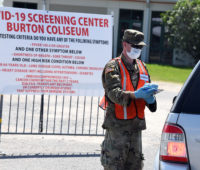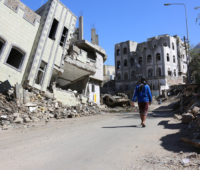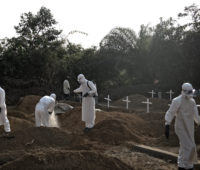Nigeria confirmed its first case of Covid-19 on February 27, 2020, when an Italian citizen on a business trip from Milan who had arrived in Lagos on February 25 tested positive for the virus. By March 22, when governments at both the federal and state levels began to intensify measures to contain the contagion, about twenty-seven cases were already confirmed. There were widespread concerns that the fragile public health-care system of Africa’s most populous country, with a population of 200 million people, would be unable to cope with a rapidly spreading pandemic. It would require quick action to prevent a large number of people from being infected and provide treatment to existing Covid-19 patients.
Starting with SSRC president Alondra Nelson’s reflections on “Society after Pandemic,” this series of essays explores the human, social, political, and ethical dimensions of Covid-19. These pieces call attention to how social research can shed light on the short- and long-term effects of the pandemic and what can be done to improve responses, both now and in the future.
The publication of this series would not be possible if not for the help of the following SSRC staff:
Juni Ahari, communications and editorial assistant.
Cole Edick, program associate, Anxieties of Democracy and Media & Democracy programs.
Carrie Hamilton, program assistant, Social Data Initiative and Media & Democracy program.
Saarah Jappie, program officer, Transregional Collaboratory on the Indian Ocean.
Michelle Lee, program assistant, International Dissertation Research Fellowship.
Line Sidonie Talla Mafotsing, communications and editorial assistant, African Peacebuilding Network and Next Generation Social Sciences in Africa.
Daniella Sarnoff, program director, International Dissertation Research Fellowship.
Catherine Weddig, program assistant, Social Data Initiative and Media & Democracy program.
Themes
Essays


Violence against Women and Girls in the Shadow of Covid-19: Insights from Africa
by Titilope AjayiActivists, journalists, and the United Nations (UN) have drawn attention to a so-called shadow pandemic, an allusion to rising global levels of sexual and gender-based violence (SGBV) against women and girls, as a result of Covid-19 and state responses to it. Reports by global media highlight the situation in Europe, but Africa is not exempt. Liberia, Nigeria, Kenya, Côte d’Ivoire, and Uganda, like China, France, and Spain, are among the countries that have reported surges in violence against women and girls (VAWG) since the pandemic began. Guided by the question “what don’t we know about how pandemics affect SGBV?” this article shares insights into VAWG in several African countries and explores some possible solutions.

Qatar, the Coronavirus, and Cordons Sanitaires: Migrant Workers and the Use of Public Health to Define the Nation
by Natasha N. IskanderIn her contribution to our “Covid-19 and the Social Sciences” series, Natasha Iskander analyses labor migration in the midst of the pandemic and the ways in which migrants are multiply vulnerable. She reports on her research on labor camps in Qatar and the state’s deployment of a cordon sanitaire in the wake of the coronavirus’ spread, situating this current use of the cordon into a broader historical perspective on its use as a tool for excluding marginalized groups. Iskander connects Qatar’s treatment of foreign workers to a vision of the state’s high-tech future in which laborers are increasingly disposable—a vision that the pandemic may be brutally helping to realize.

Risk for “Us,” or for “Them”? The Comparative Politics of Diversity and Responses to AIDS and Covid-19
by Evan LiebermanIn his essay for our “Covid-19 and the Social Sciences” series, Evan Lieberman writes about the influence of social diversity on the politics of infectious disease control. How does the articulation of ethnic, racial, and national boundaries impede effective policy responses? Using the AIDS crisis as a comparative case-study, Lieberman asks if data that emphasize ethnic, racial, and national categories—while they may be intended to highlight and mitigate disparities—have the potential to stigmatize vulnerable groups during a pandemic. He calls on social science to investigate how such categories influence risk perceptions, citizen behaviors, and government responses.

Research in Times of Crisis: Caring for Researchers’ Mental Health in the Covid-19 Era
by An AnsomsIn her contribution to the “Covid-19 and the Social Sciences” essay series, An Ansoms reflects on how universities and scientific institutions can support researchers working in crisis contexts. Unpicking the toll that such contexts can take on researchers, Ansoms lays out an institutional strategy for providing support through training, coaching, and care. By undertaking a deliberate strategy for developing resilience, institutions can ensure that researchers are able to cope with the emotional challenges posed by carrying out research in times and places of crisis.

Research in Insecure Times and Places: Ethics of Social Research for Emerging Ecologies of Insecurity
by Tatiana Carayannis and Annalisa BolinAs part of the “Covid-19 and the Social Sciences” essay series, this theme on “Social Research and Insecurity” brings together scholars from across the social sciences to examine our longstanding research practices and develop new ones in response to the insecurity that Covid-19 has created. In this introductory essay, Tatiana Carayannis and Annalisa Bolin outline the new valences of research in the pandemic era, from security challenges for both researchers and researched to new methodologies for gathering data remotely and the need to reflect on the changing roles of institutions. Throughout this theme, researchers with experience working in contexts of insecurity provide a roadmap for both the pitfalls of and possible solutions for navigating research in the age of the coronavirus.

Covid-19 and Eritrea’s Response
by Redie BereketeabThe challenge of responding to the Covid-19 pandemic is immense for poor countries like Eritrea. Eritrea has always depended on its people in responding to crises situations. This time, Eritreans are being effectively mobilized to confront the Covid-19 pandemic. On March 21, 2020, Eritrea’s information minister, Yemane Gebremeskel, confirmed the news that an Eritrean who had returned from Norway had become the country’s first case of Covid-19. Eritrea announced and implemented a twenty-one-day nationwide lockdown beginning April 2. This was in addition to previously announced measures including the closure of airports, seaports, and land borders.

Sub-Saharan Africa Will Most Likely Ride Out the Covid-19 Storm
by Duncan Omanga and Bartholomew OndigoAmid the ongoing Covid-19 carnage, there are fears that Africa will be blown apart by the virus. World Health Organization (WHO) Director General Tedros Adhanom Ghebreyesus issued a chilling warning to African countries: “The best advice for Africa is to prepare for the worst.” It was not an idle warning. Africa has been the stage for pandemics before. Besides, as two French doctors unconsciously expressed on television, sub-Saharan Africa is occasionally where ethical boundaries are pushed when developing vaccines. Meanwhile, many global media outlets are foretelling another African disaster.

Dealing with a Global Pandemic in an Interconnected World
by Admire MareCovid-19 has not only overstretched the existing boundaries of scientific inquiry, it has made us realize that all knowledge is incomplete. As Francis Nyamnjoh aptly notes, “incompleteness is the normal order of things, and that conviviality invites us to celebrate and preserve incompleteness and mitigate the delusions of grandeur that come with ambitions and claims of [knowledge] completeness.”

Covid-19: Social Distancing and Lockdown in Black Townships in South Africa
by Godfrey MaringiraCovid-19 has affected all forms of social and economic activity in and around the world. In response to the rapid spread of the novel coronavirus, governments have been forced to implement the global standard measures to curb the contagion. These measures include social distancing, quarantine, partial or total lockdown, and other restrictive measures. However, differences in context are often ignored in applying these measures, when there ought to be some modification of certain measures in some places.




